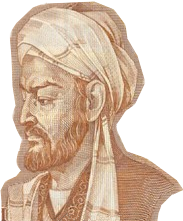
Back Avicenna Afrikaans Avicenna ALS ኢብን ሲና Amharic Avicena AN ابن سينا Arabic ابن سينا ARZ Avicena AST İbn Sina Azerbaijani ابن سینا AZB Әбүғәлисина Bashkir
| Avicena (em persa: ابن سینا; romaniz.: Ibn Sina; lit. "Filho de Sina"; latinizado como Avicena; AFI: [ævɪˈsɛnə, ˌɑːvɪ]) | |
|---|---|
 | |
| Nome completo | Abu Ali Huceine ibne Abedalá ibne Sina |
| Pseudônimo(s) | Ibn Sina |
| Outros nomes |
|
| Nascimento | c. 980 Laq-Laqa ou Khomeitan, Transoxiana, Império Samânida (atualmente, em Afexana, Coração, no Uzbequistão) |
| Morte | 22 de junho de 1037 (57 anos)[1] Hamadã, Império Cacuída, (atualmente, no Irã) |
| Residência | Rey, Bucara, Urguenche, Gurgã e Hamadã |
| Nacionalidade | persa[2] |
| Etnia | Persa/Árabe |
| Ocupação | |
| Magnum opus | |
| Escola/tradição | |
| Principais interesses | |
| Ideias notáveis |
|
| Religião | Islamismo (xiita) |
Abu Ali Huceine ibne Abedalá ibne Sina[3](em persa: ابو علی الحسین ابن عبدالله ابن سیناابو علی الحسین ابن عبدالله ابن سینا; em árabe: أبو علي الحسین بن عبدالله بن سینا; romaniz.: Abū ‘Alī al-Husayn ibn ‘Abd Allāh ibn Sĩnã; nascido em Laq-Laqa ou Khomeitan (atualmente, em Afexana, Coração, no Uzbequistão) em c. 980 – falecido em Hamadã, (atualmente, no Irã), em 1037), conhecido como Ibn Sīnā (em persa: ابن سینا; romaniz.: Ibn Sina; lit. "Filho de Sina"; latinizado como Avicena; AFI: [ævɪˈsɛnə, ˌɑːvɪ]), foi um polímata persa[4][5][6][7] que escreveu tratados sobre vários assuntos, dos quais aproximadamente 240 chegaram aos nossos dias. Em particular, 150 destes tratados se concentram em filosofia e 40 em medicina.[8][9]
As suas obras mais famosas são o “O Livro da Cura”, uma vasta enciclopédia filosófica e científica, e o “O Cânone da Medicina”,[10] que era o texto padrão em muitas universidades medievais,[11] entre elas a Universidade de Montpellier e a Universidade Católica de Lovaina, ainda em 1650.[12] Ela apresenta um sistema completo de medicina em acordo com os princípios de Galeno e Hipócrates.[13][14]
Suas demais obras incluem ainda escritos sobre filosofia, astronomia, alquimia, geografia, psicologia, teologia islâmica, lógica, matemática, física, além de poesia.[15] Ele é considerado o mais famoso e influente polímata da Era de Ouro Islâmica.[16]
- ↑ Encyclopedia of Islam: Vol 1. 1 1.ª ed. Lahore, Paquistão: [s.n.] 1964. p. 562
- ↑ Nasr, Seyyed Hossein (2007). «Avicenna». Encyclopædia Britannica Online. Consultado em 5 de novembro de 2007
- ↑ (Goichon 1999)
- ↑ Paul Strathern (2005). A brief history of medicine: from Hippocrates to gene therapy. [S.l.]: Running Press. p. 58. ISBN 9780786715251
- ↑ Brian Duignan (2010). Medieval Philosophy. [S.l.]: The Rosen Publishing Group. p. 89. ISBN 9781615302444
- ↑ Michael Kort (2004). Central Asian republics. [S.l.]: Infobase Publishing. p. 24. ISBN 9780816050741
- ↑ * Ibn Sina ("Avicenna") Encyclopedia of Islam. 2nd edition. Edited by P. Berman, Th. Bianquis, C.E. Bosworth, E. van Donzel and W.P. Henrichs. Brill 2009. Accessed through Brill online: www.encislam.brill.nl (2009) Quote: "He was born in 370/980 in Afshana, his mother's home, near Bukhara. His native language was Persian."
- A.J. Arberry, "Avicenna on Theology", Kazi Pubn Inc, 1995. excerpt: "Avicenna was the greatest of all Persian thinkers; as physician and metaphysician"
- Henry Corbin, "The Voyage and the messenger: Iran and Philosophy", North Atlantic Books, 1998. pg 74:"Whereas the name of Avicenna (Ibn sinda, died 1037) is generally listed as chronologically first among noteworthy Iranian philosophers, recent evidence has revealed previous existence of Ismaili philosophical systems with a structure no less complete than of Avicenna". [1]
- ↑ «Avicenna (Abu Ali Sina)». Sjsu.edu. Consultado em 19 de janeiro de 2010
- ↑ O'Connor, John J.; Robertson, Edmund F., «Avicena», MacTutor History of Mathematics archive (em inglês), Universidade de St. Andrews
- ↑ Nasr, Seyyed Hossein (2007). «Avicenna». Encyclopædia Britannica Online. Consultado em 5 de novembro de 2007
- ↑ «Avicenna 980-1037». Hcs.osu.edu. Consultado em 19 de janeiro de 2010
- ↑ «Medicine: an exhibition of books relating to medicine and surgery from the collection formed by J.K. Lilly». Indiana.edu. Consultado em 19 de janeiro de 2010
- ↑ Edwin Clarke, Charles Donald O'Malley (1996). The human brain and spinal cord: a historical study illustrated by writings from antiquity to the twentieth century. Norman Publishing. p.20. ISBN 0930405250
- ↑ Iris Bruijn (2009). "Ship's Surgeons of the Dutch East India Company: Commerce and the Progress of Medicine in the Eighteenth Century". Amsterdam University Press. p.26. ISBN 9087280513
- ↑ «Avicenna", in Encyclopaedia Iranica, Online Version 2006». Iranica.com. Consultado em 19 de janeiro de 2010
- ↑ «Avicenna (Persian philosopher and scientist) - Britannica Online Encyclopedia». Britannica.com. Consultado em 7 de janeiro de 2012